ActEU
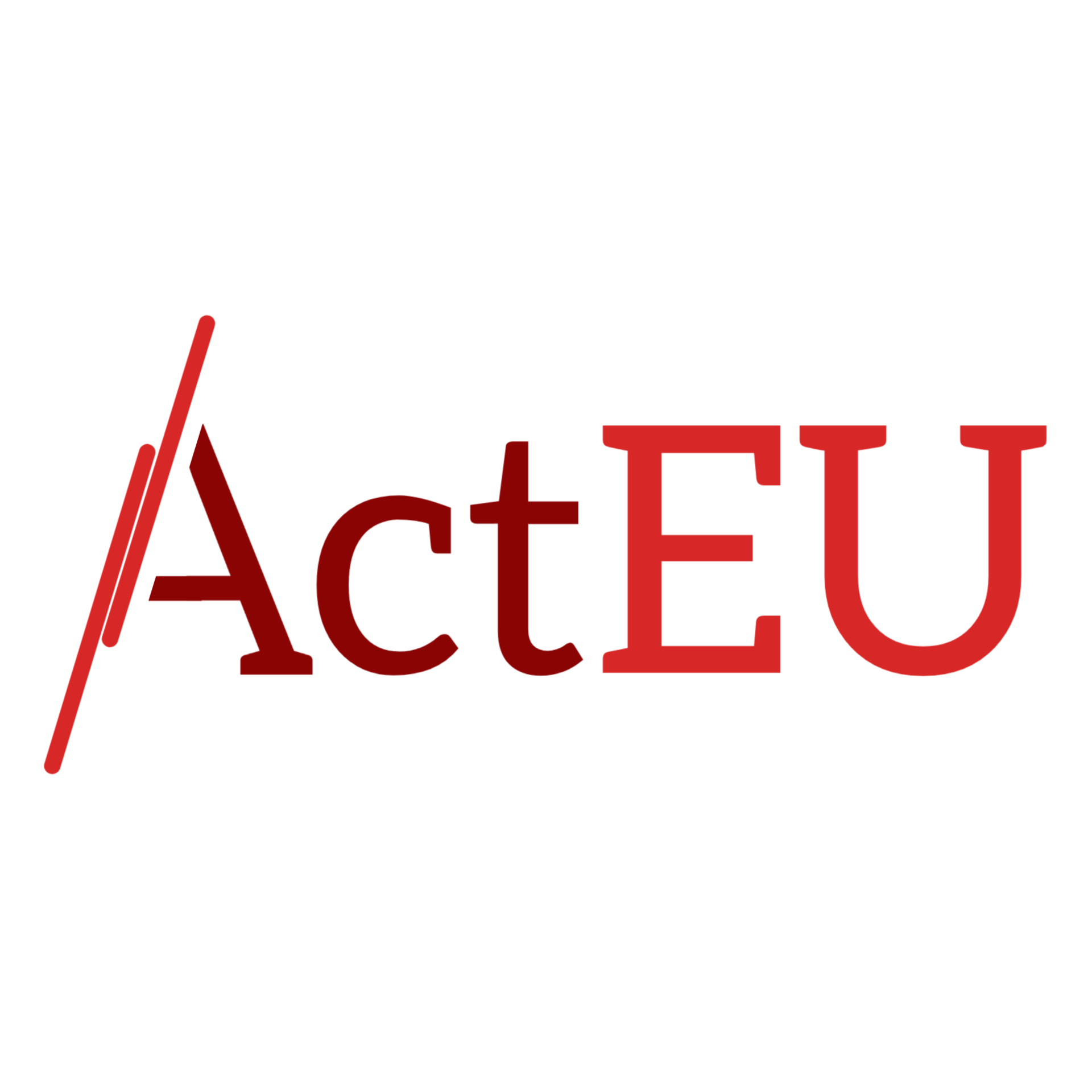
Title: Towards a new era of representative democracy - Activating European citizens' trust in times of crises and polarization (ActEU)
General information:
- Homepage
- Presentation video
- Team members
- ActEU Civil Society Network
- Start date: March 2023
- Funding: Horizon Europe - Framework Programme for Research and Innovation, 2021-2027) within the funding line "HORIZON-CL2-2022-DEMOCRACY-01 (Reshaping democracies)
- Collaborative partners: University of Duisburg-Essen, Saarland University, Paris Lodron University Salzburg (Austria), Trans European Policy Studies Association (Belgium), Institute of International Relations Prague (Czech Republic), Abo Akademi University (Finland), Fondation Nationale des Sciences Politiques Paris (France), Institut Catholique de Lille (France), Aristotle University of Thessaloniki (Greece), Universita Degli Studi di Trento (Italy), SWPS University of Social Sciences and Humanities, Warsaw (Poland), Universidad de Oviedo (Spain)
Contents: The ActEU project aims to find answers to the following questions: How can we conceptualise and empirically measure political trust and legitimacy beyond the usual survey question "How much trust do you have in the Parliament?"? Does the multi-level character of European representative democracies require an identical level of support from citizens at regional, national and EU level? To what extent does social polarisation on key political issues of our time - immigration, climate change and gender inequality - challenge political trust in and legitimacy of democratic political systems? And what can policymakers and civil society do to address these challenges?
ActEU has two overarching goals: In phase 1, we examine the persistent problems of declining trust, legitimacy and representation in Europe with a special focus on the polarisation of societies and the multi-level structures of the EU. To this end, the team based at Saarland University and led by Prof. Dr. Daniela Braun provides a conceptual framework for political attitudes, behaviour and representation across Europe and creates an original empirical infrastructure based on an innovative combination of methods and newly collected quantitative and qualitative empirical data (focus groups, experimental surveys, web scraping). In phase 2, these results will feed directly into the development of a toolkit of remedial actions to improve political trust in and legitimacy of European representative democracies (including through a civil society network, Youth Democracy Labs in 13 European cities; "Cartooning for democracy").
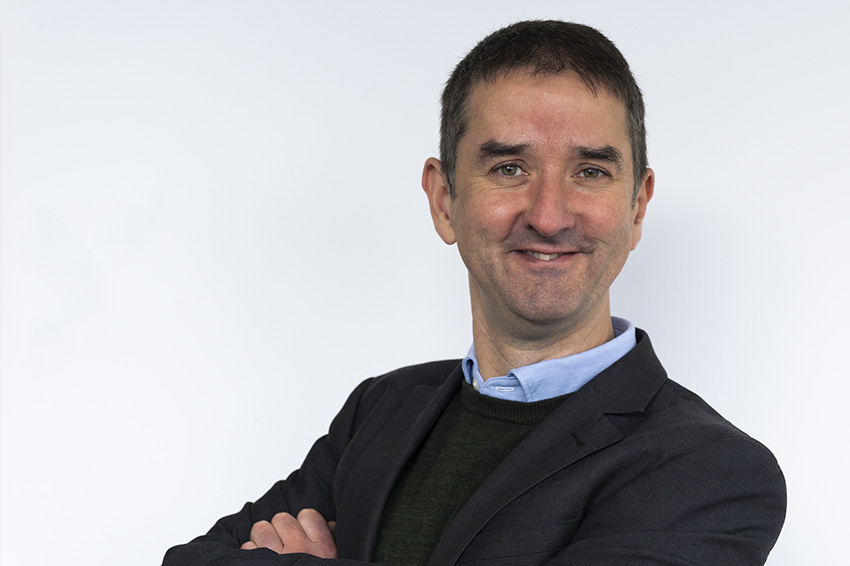
Recording: "Triggers of political engagement"
Dr Alex Hartland gave a presentation at the ActEU Mid-Term Conference entitled “Triggers of political engagement”, in which he described when and how individuals in civil society become politically engaged. The Mid-Term Conference of the Horizon Europe project ActEU took place in Brussels in December 2024. This scientific conference entitled "Strengthening democracy: Building trust and tackling polarisation in Europe" brought together researchers and policy makers to assess the main challenges and achievements of the project. The recording of the presentation is now available online:

Youth Democracy Lab
On 24 May, it was time again for the Open Campus Day at Saarland University. In addition to many lectures and participation in two information stands, Professor Braun's department also organised a Youth Democracy Lab as part of the Horizon-funded EU project ActEU under the title “Is trust in European politics at risk?”. Participants were able to get involved, address problems or suggest solutions.
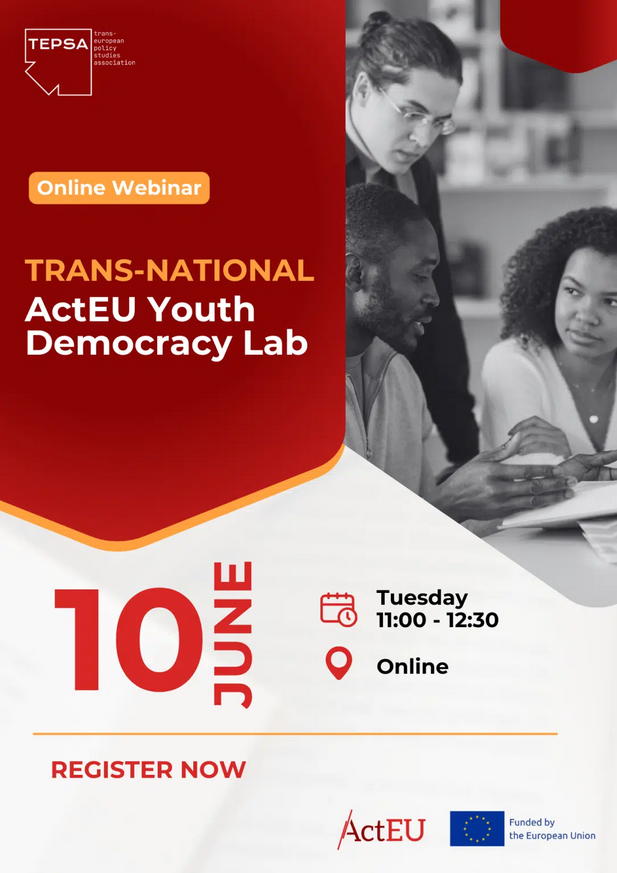
Call for Applications: ActEU Trans-National Youth Democracy Lab
Europe’s democracies are being tested. Trust is eroding. Facts are under fire. Institutions feel distant. And yet, young people across the continent still believe in building a better and more sustainable future.
The Trans-National Youth Democracy Lab, within the framework of the Horizon Europe “Activating European Citizens’ Trust in Times of Crises and Polarization (ActEU)” project, is a space for young people from across Europe to come together and take these issues seriously. Not through lectures. Not through panels. But through small-group conversations that aim to generate honest insights and practical, actionable recommendations. Your deliberations will inform a final recommendations paper which will be shared with a broad network of experts and policy-makers.
The event will take place online on 10 June, 11:00-12:30 CEST. Application Deadline: 27 May.

Looking back at the DVPW conference
The annual conference of the German Political Science Association (DVPW) has found a more than exciting venue this year in Saarland University: Political science was only recently revitalised here in the form of two chairs as part of the also very young faculty of European social science research. We were therefore all the more delighted to welcome political scientists from Germany and all over the world. The conference panels and the keynote speech with Bundesrat President Anke Rehlinger led to an exciting exchange on political trust in today's world, and the conference showed that the Saarland University is developing into a centre for political science: Saarland University is developing into an important part of the political science landscape in Germany that you better keep on your radar!
We would like to thank all participants for their active participation, Anke Rehlinger for taking the time for our keynote despite the ongoing coalition negotiations, and the Saarbrücker Zeitung for the two articles published as part of the conference:
“Heimspiel für Anke Rehlinger”
Interview with Prof Dr Daniela Braun and Prof Dr Georg Wenzelburger
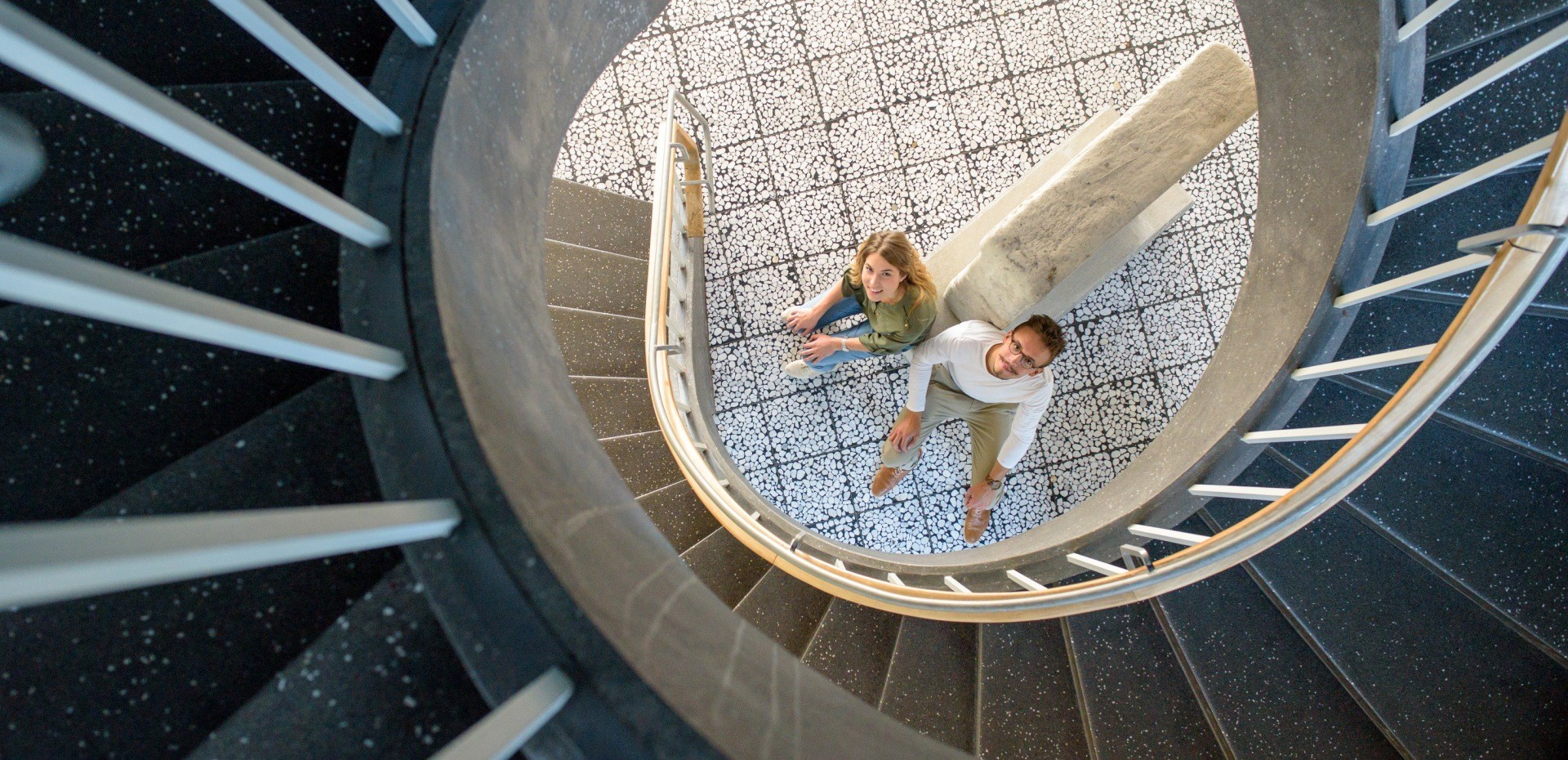
Press release about the DVPW conference
Topics such as trust and distrust in politics as well as social polarisation are the focus of a political science conference on 27 and 28 March, which will bring together experts from Germany and abroad at Saarland University.
They will discuss their current research on one of the most pressing problems of representative democracy: the dwindling trust of citizens in “their” political system and institutions. The symposium of the “Comparative Politics” section of the German Political Science Association (DVPW) is being organised by Professor Daniela Braun and Professor Georg Wenzelburger in cooperation with the University of Duisburg-Essen.
ActEU video presentation
The Trans European Policy Studies Association (TEPSA) has published a video as part of the ActEU kick-off conference in which Prof Dr Daniela Braun and Prof Dr Michael Kaeding present the Horizon-funded EU project ActEU.

Contribution to the WDR 5 podcast „Wissenschaft und mehr“ (Science and more)
On 7 November 2024 Prof Dr Daniela Braun took part in the episode „Wiener Narrenturm und Psychiatrie – 1,5-Grad-Schwelle – Glaube“ of the WDR 5 podcast „Wissenschaft und mehr“. Among other issues the episode was related to the matter of trust in political institutions and the political system.

Conclusion on the ActEU Mid-Term Conference
On 12 December, the ActEU Mid-Term Conference took place in Brussels to present the first results of the project and promote collaboration between researchers and various stakeholders. Dr Alex Hartland presented his and Prof Dr Daniela Braun's work in two presentations: “Engagement triggers in response to controversial policies” and “Polarisation among EU political parties”. After the conference, participants had the opportunity to socialise over dinner in a more informal setting.

ActEU Mid-Term Conference
The political chair at the University of Saarland are pleased to share with you the draft programme for the ActEU Mid-Term Conference, which will take place on Thursday, 12 December 2024 in Brussels. The event will showcase the project’s initial findings and foster collaboration between academics and diverse stakeholders. Following the conference, we will host a dinner to further engage with all participants in a more informal setting. We hope you will be able to join us for this evening gathering, as it would be a great opportunity to continue the conversations and strengthen our collaborative ties.
Additionally, a workshop with an interactive session (the programme will be available in the coming days) with our Civil Society Network will take place the day after, on Friday 13 December 2024 (9:00-13:30) . Please let us know if you are interested in participating, as your insights and expertise would be a valuable addition to the discussions.

“Securing Europe’s Future” Polish Pre-Presidency Conference, Warsaw, 21-22 November 2024
On 1 January 2025, Poland will take over the rotating presidency of the Council of the European Union for the second time. Following a politically charged and controversial Hungarian Presidency, the Polish Presidency will face a number of challenges in the first half of the year. In order to tackle these successfully, a solid basis for decision-making is required. This highlights the importance of bridging the gap between policy makers, academics and citizens in Europe.
The Trans European Policy Studies Association (TEPSA) and the Institute for European Studies at Jagiellonian University have therefore organised the conference “Securing Europe's Future” in Poland. The aim of the conference is to discuss which goals, priorities and policy areas in the EU require the most attention. TEPSA will also make recommendations to the future Council Presidency at the conference, which will serve as preparation for the Polish Council Presidency.
At the conference, Prof Dr Daniela Braun will present the EU-funded Horizon project “Activating Citizens Trust in Times of Crises and Polarisation (ActEU)” on 21 November in the panel “EU Democracy Renewal: Addressing the Pressures on Representative Democracy in Europe”, moderated by Petr Kratochvíl of the Institute of International Relations.
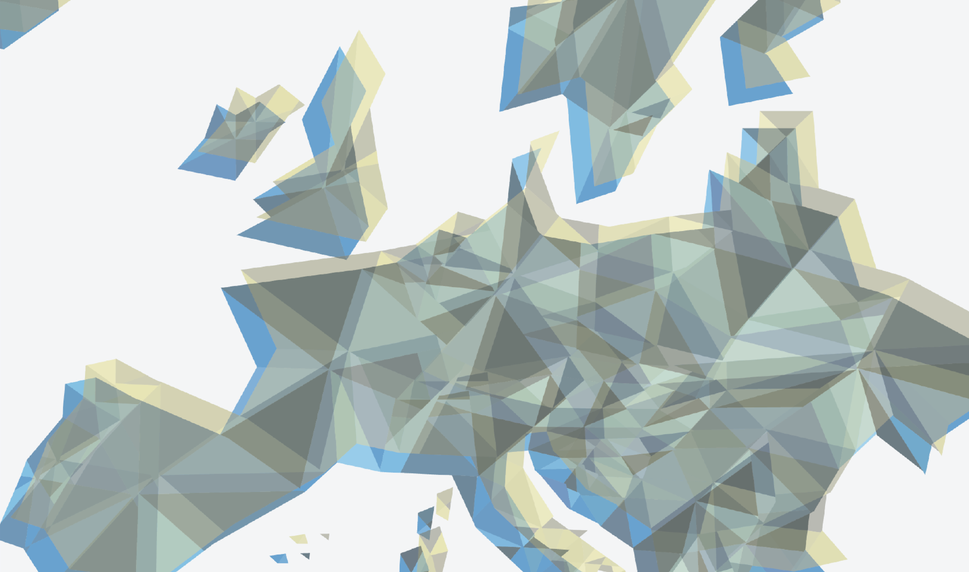
4th Saarbrücken Europe Conference at the UdS
Europe dreams? Between political ambition and social reality
The 4th Saarbrücken Europe Conference will open on 28 November with a panel discussion on the topic of “Visions of Europe. Franco-German perspectives” at Saarbrücken Town Hall. The next day, the programme of events will take place at Saarland University. This primarily includes panels on political and social topics. At 11:45, Prof. Dr Daniela Braun will give a lecture on the effects of consolidated Euroscepticism on European politics.

ActEU-Workshop: Aufruf zur Einreichung von Bewerbungen
In February 2025, the ActEU Doctoral School will take place, where participants will spend four days exploring the topics of the ActEU research project, helping to advance our understanding and solutions. The ActEU (Activating European Citizens' Trust in Times of Crises and Polarisation) project, funded under the EU's Horizon Europe programme, aims to conceptualise and empirically measure political trust and legitimacy beyond conventional methods to explore how policy makers and civil society can respond effectively to these challenges to support democratic governance.
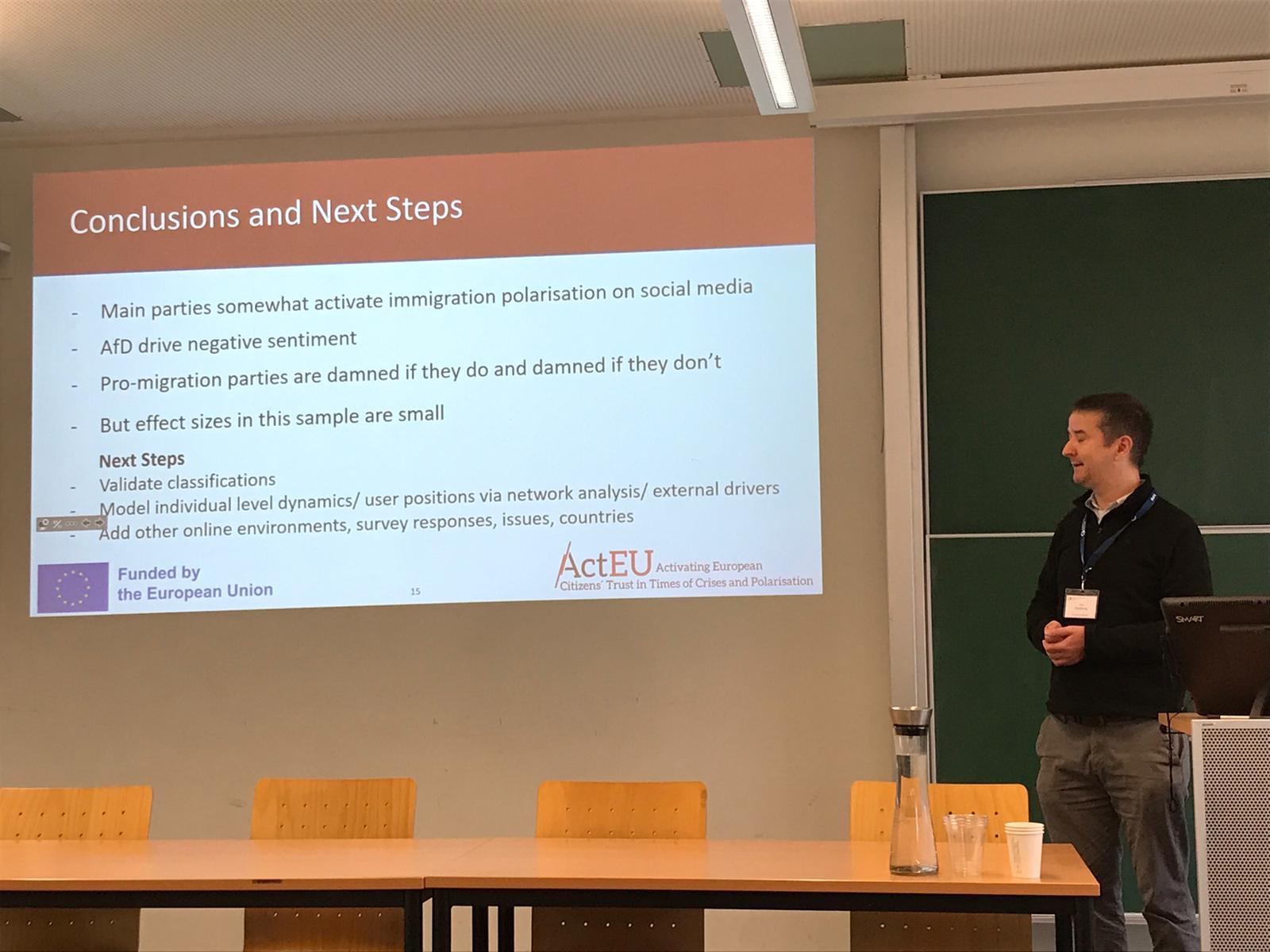
ActEU at the DVPW Congress in Göttingen
From 24 to 27 September, the congress of the German Political Science Association on “Politics in the Polycrisis” took place at the Georg August University in Göttingen. Dr Alex Hartland gave a presentation titled “From Top to Bottom: Explaining the relationship between elite polarisation and mass polarisation”.

EPSA conference in Cologne
From 4 to 6 July 2024, the 14th annual conference of the European Political Science Association took place in the MediaPark Cologne. Professor Braun's department also took part in the conference and gave four presentations, including one by Alex Hartland entitled “From Top to Bottom: Explaining the relationship between elite polarisation and mass polarisation”, in which he presented findings from the ActEU project.
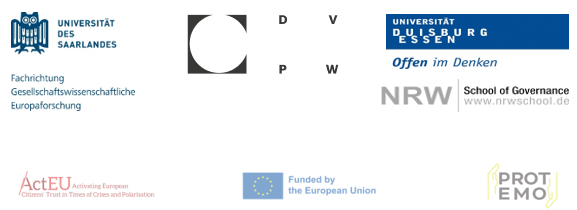
Aufruf zur Einreichung von Beiträgen für DVPW-Tagung an der Universität des Saarlandes
Im März 2025 wird an der Universität des Saarlandes eine Tagung der Deutschen Vereinigung für Politikwissenschaft abgehalten. Die Veranstaltung unter dem Titel „Citizen’s trust and societal polarization in times of transformation. Comparative Perspectives from different world regions“ untersucht eines der drängendsten Probleme repräsentativer Demokratien: Das Ver- bzw. Misstrauen der Bürger:innen in "ihr" politisches System, in Institutionen und Politiker:innen.

EU project ActEU turns one year old
The Horizon-funded EU project ActEU has now been running for a year. Prof Daniela Braun and Dr Alex Hartland will present the first results in June at the conference Emotional Dynamics of (In)security and Politics at Saarland University, in July at the annual EPSA conference in Cologne and in September at the DVPW Congress in Göttingen.
The ActEU project aims to find answers to the following questions: How can we conceptualise and empirically measure political trust and legitimacy beyond the usual survey question "How much trust do you have in the Parliament?"? Does the multi-level nature of European representative democracies require an identical level of support from citizens at regional, national and EU level? To what extent does social polarisation on key political issues of our time - immigration, climate change and gender inequality - challenge political trust in democratic political systems and their legitimacy? And what can political decision-makers and civil society do to overcome these challenges?
Further information

Lecture "Representative democracy in decline"
On October 19, Alex Hartland gave his lecture "Representative democracy in decline" at Fraunhofer ISI. He presented an overview of the ActEU project.
The ISI lecture series bundles exciting topics from the Fraunhofer ISI portfolio and offers opportunities for discussion and exchange at regular intervals.

TEPSA Training: "Inside the European Parliament"
Prof. Daniela Braun will participate in the Trans European Policy Studies Association's online seminar from 11-13 October 2023. 20 students will have an opportunity to gain first-hand insights from researchers, EU practitioners, and policymakers on the functioning of the European Parliament, its role in the complex architecture of EU governance, and the role of youth electoral participation. The event takes place in the framework of the ActEU project.

Lecture by Prof Dr Daniela Braun
"How can we Measure, Study and Improve Citizens' Dissatisfaction with Representative Democracy in the EU's Multi-level System?" - Prof. Daniela Braun will give a lecture on this topic on 19 September 2023 from 12-13:30. This will provide an insight into the ActEU project funded by Horizon Europe.
The event will take place in building A 5 6 in room A 231. Further information

